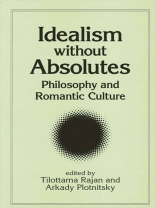Idealism without Absolutes offers an ambitious and broad reconsideration of Idealism in relation to Romanticism and subsequent thought. Linking Idealist and Romantic philosophy to contemporary theory, the volume explores the multiplicity of different philosophical incarnations of Idealism and materialism, and shows how they mix with and invade each other in philosophy and culture. The contributors discuss a wide range of major figures in the long Romantic period, from Kant and Hegel to Nietzsche, as well as key figures defining the contemporary intellectual debate, including Freud, Heidegger, Adorno, Lyotard, Derrida, de Man, and Deleuze and Guattari. While preserving the significance of the historical period extending from Kant to the early nineteenth century, the volume gives the concept of Romantic culture a new historical and philosophical meaning that extends from its pre-Kantian past to our own culture and beyond.
İçerik tablosu
Acknowledgments
Introduction
Tilottama Rajan
Romanticism and the Invention of Literature
Jan Plug
Allegories of Symbol: On Hegel’s Aesthetics
Andrzej Warminski
Toward a Cultural Idealism: Negativity and Freedom in Hegel and Kant
Tilottama Rajan
Mediality in Hegel: From Work to Text in the Phenomenology of Spirit
Jochen Schulte-Sasse
Beyond Beginnings: Schlegel and Romantic Historiography
Gary Handwerk
Curvatures: Hegel and the Baroque
Arkady Plotnitsky
Three Ends of the Absolute: Schelling, Holderlin, and Novalis
David Farrell Krell
Schopenhauer’s Telling Body of Philosophy
Joel Faflak
Sacrificial and Erotic Materialism in Kierkegaard and Adorno
John Smyth
Absolute Failures: Hegel’s Bildung and the ‘Earliest System-Program of German Idealism’
Rebecca Gagan
Futures of Spirit: Hegel, Nietzsche, and Beyond
Richard Beardsworth
Conclusion: Without Absolutes
Arkady Plotnitsky
Contributors
Index
Yazar hakkında
Tilottama Rajan is Canada Research Chair in English and Theory at the University of Western Ontario. She has published several books, including the coedited volume (with David L. Clark),
Intersections: Nineteenth-Century Philosophy and Contemporary Theory, published by SUNY Press.
Arkady Plotnitsky is Professor of English, a University Faculty Scholar, and Director of the Theory and Cultural Studies Program at Purdue University. He has published several books, including, most recently,
The Knowable and the Unknowable: Modern Science, Nonclassical Thought and the ‘Two Cultures.’












